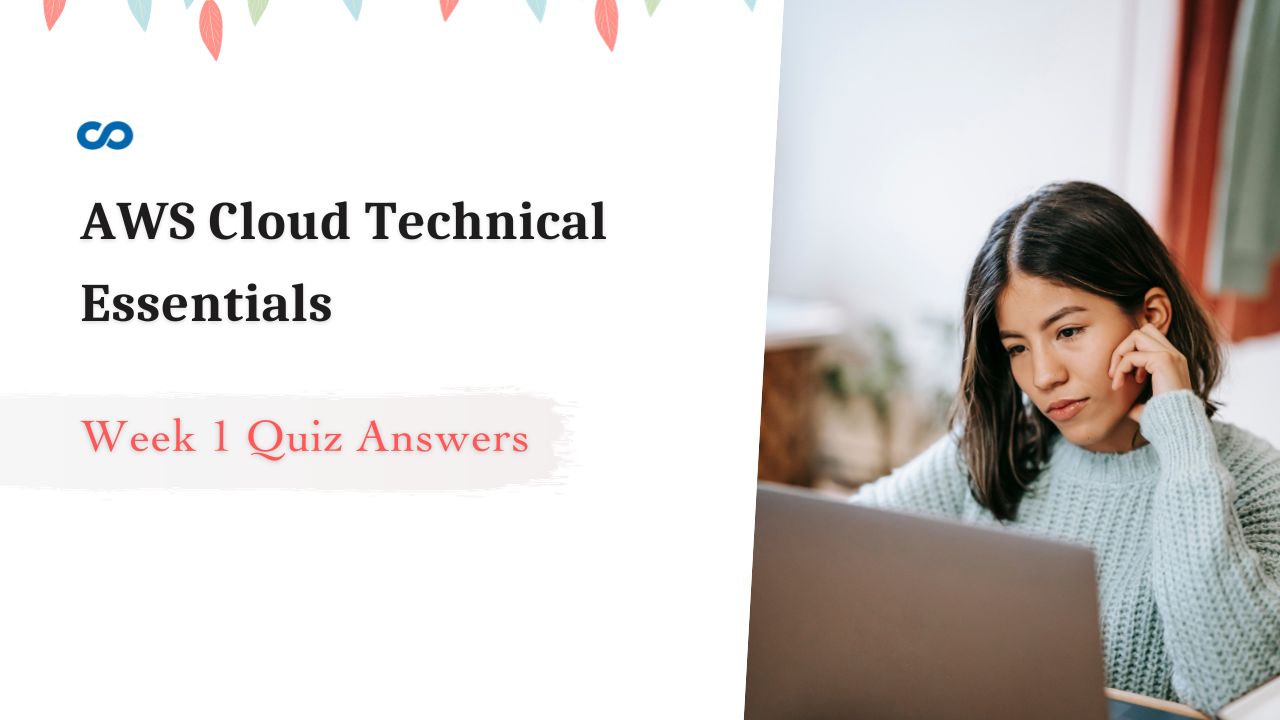AWS Cloud Technical Essentials Week 1 Quiz Answers
In this article i am gone to share AWS Cloud Technical Essentials Week 1 Quiz Answers with you..
Enrol Link: AWS Cloud Technical Essentials
AWS Cloud Technical Essentials Week 1 Quiz Answers
Question 1)
What are the four main factors that a solutions architect should consider when they must choose a Region?
- Latency, price, service availability, and compliance
- Latency, high availability, taxes, and compliance
- Latency, taxes, speed, and compliance
- Latency, security, high availability, and resiliency
Question 2)
True or False: Every action a user takes in AWS is an API call.
- True
- False
Question 3)
Which statement BEST describes the relationship between Regions, Availability Zones and data centers?
- Availability Zones are clusters of Regions. Regions are clusters of data centers.
- Data centers are cluster of Availability Zones. Regions are clusters of Availability Zones.
- Regions are clusters of Availability Zones. Availability Zones are clusters of data centers.
- Data centers are clusters of Regions. Regions are clusters of Availability Zones.
Question 4)
Which of the following is a benefit of cloud computing?
- Run and maintain your own data centers.
- Increase time-to-market.
- Overprovision for scale.
- Go global in minutes.
Question 5)
A company wants to manage AWS services by using the command line and automating them with scripts. What should the company use to accomplish this goal?
- AWS Management Console
- AWS Command Line Interface (AWS CLI)
- AWS SDKs
- AWS Management Console and AWS SDKs
Question 6)
What is a best practice when securing the AWS account root user?
- Activate AWS Identity and Access Management (IAM) access to the Billing and Cost Management console
- Use the root user for routine administrative tasks
- Change account settings
- Enable multi-factor authentication
Question 7)
A solutions architect is consulting for a company. When users in the company authenticate to a corporate network, they want to be able to use AWS without needing to sign in again. Which AWS identity should the solutions architect recommend for this use case?
- AWS account root user
- AWS Identity and Access Management (IAM) user
- IAM Role
- IAM Group
Question 8)
Which of the following can be found in an AWS Identity and Access Management (IAM) policy?
- Effect
- Action
- Object
- A and B
- B and C
Question 9)
True or False: AWS Identity and Access Management (IAM) policies can restrict the actions of the AWS account root user.
- True
- False
Question 10)
According to the AWS shared responsibility model, which of the following is the responsibility of AWS?
- Controlling the operating system and application platform, as well as encrypting, protecting, and managing customer data.
- Managing customer data, encrypting that data, and protecting the data through network firewalls and backups.
- Managing the hardware, software, and networking components that run AWS services, such as the physical servers, host operating systems, virtualization layers, and AWS networking components.
- Managing customer data, encrypting that data, and protecting the data through client-side encryption.
Question 11)
Which of the following is recommended if a company has a single AWS account, and multiple people who work with AWS services in that account?
- All people must use the root user to work with AWS services on a daily basis.
- The company should create an AWS Identity and Access Management (IAM) group, grant the group permissions to perform specific job functions, and assign users to a group, or use IAM roles.
- The company must create AWS Identity and Access Management (IAM) users, and grant users the permissions to perform specific job functions.
- The company must create an AWS Identity and Access Management (IAM) user and grant the user the permissions to access all AWS resources.
Question 12)
True or False: According to the AWS shared responsibility model, a customer is responsible for security in the cloud.
- True
- False
Question 13)
Which of the following provides temporary credentials (that expire after a defined period of time) to AWS services?
- Principle of least privilege
- IAM role
- Identity provider (IdP)
- AWS IAM Identity Center (successor to AWS Single Sign-On)
Question 14)
A user is hosting a solution on Amazon Elastic Compute Cloud (Amazon EC2). Which networking component is needed to create a private network for their AWS resources?
- Virtual private cloud (VPC)
- Instance
- Tags
- Amazon Machine Image (AMI)

